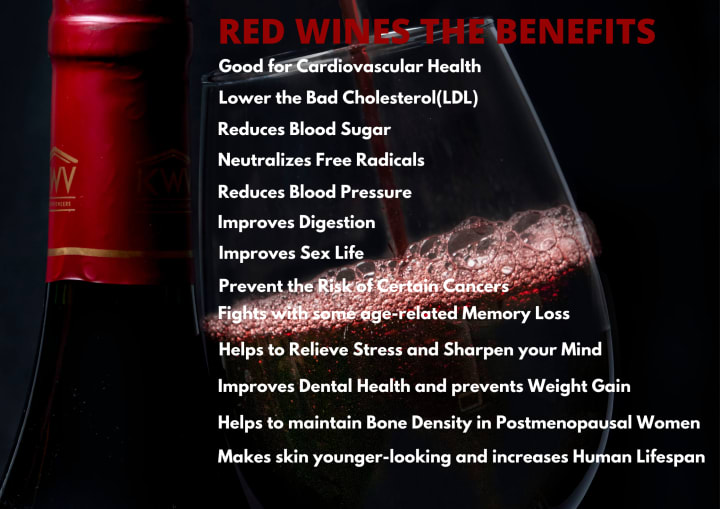The Top 6 Healthiest Dry Red Wines That Undoubtedly Pack a Big Punch!
Few Scientifically Proven Facts of Dry Red Wine You Can’t Avoid!

Do you need an excuse to uncork a bottle and take a sip of your favorite pinot noir or malbec? Of course not, right? Drinking red wines may offer many health benefits. It’s helpful in heart disease, cancer, low blood pressure, and so on.
But have you ever wondered which dry red wines are the healthiest? And what makes them best for your health?
Sound good? Great, let’s dig into it!
Do dry red wines have less sugar?
Don’t get confused with the term “dry.” It’s not going to “dry” out your mouth. It simply means it’ll create some drying sensation in your mouth.
Dry wines are nothing but the conversion of all residual sugar into alcohol. So, you won’t feel the sweetness but get the mouth-watering fruity flavor.
Why is red wine good for health?

Apart from creating some warm and delicious sensations on your tongue, a glass of red comes up with a complex mix of plant chemicals. According to recent studies, these phytochemicals bring some very legit health benefits.
Antioxidants — The role of antioxidants in your body is to balance the free radicals. It keeps the free radicals in check by reducing oxidative stress. This oxidative stress links to heart disease, cancer, diabetes, arthritis, and so forth.
These antioxidants are present in the skin and seeds of grapes. During ‘maceration’ (winemaking process), it leached from grape skins and seeds.
Flavonoids — The healthiest red wines contain a high amount of flavonoid- Resveratrol. According to Mayo Clinic, “Resveratrol might help prevent damage to blood vessels, reduce low-density lipoprotein (LDL) cholesterol (the “Bad” cholesterol) and prevent blood clots.”
It can act on cancer to regulate ‘angiogenesis’ ( promotes cancer). It plays some role in autoimmune disorders also. There’re some other flavonoids in red wines that pack a healthy punch.
Polyphenols — You can fill your glass with reds to get some health benefits from polyphenols. They’re more concentrated in red wines than any other alcoholic beverage.
Wine with a high amount of procyanidins (condensed tannin) makes your heart healthier. It improves artery functions and also reduces the chance of platelet clumps. They also have some inflammation-reducing compounds that will boost your immunity.
Which is the healthiest red wine to drink?

Want to finish your day with a glass of your favorite vino? Then why not with a healthier one!
First, you need to know not all reds have equal health benefits. It depends on the fermentation processes, chemical compounds, and soil where the vines are grown.
Take a look at the six most heart-healthy dry red wines that you can go for.
PINOT NOIR
Are you a dry wine lover and want to get an earthy and spicy sensation? Go for pinot (French for “pine”) noir (French for “black”). It gives you a flavor of dark cherries, redcurrant along with the notes of soil and mushrooms.
Pinot noir is one of the healthiest red wines and my top pick. It’s rich in resveratrol. They also provide a healthy dose of anthocyanin and procyanidins but with low tannin.
It has low sugar and fewer calories than other fuller-bodied wines. The alcohol by volume (ABV) ranges from 12% to 15%.
Health Benefits of Pinot Noir
- The massive concentration of resveratrol helps to reduce the chance of osteoarthritis. It maintains bone density in postmenopausal women.
- It improves insulin sensitivity, brain health, increases lifespan, and reduces cancer.
- According to a report published by the American Journal of Clinical Nutrition in 2016, Pinot noir can increase the level of omega-3 fatty acids. It has some anti-atherosclerotic properties and also balances the gut microbes.
- Other antioxidants in pinot noir have some bad cholesterol-reducing properties. And It also makes room for more good cholesterol.
MALBEC
Malbec has four times the amount of antioxidants as a popular merlot and twice found in cabernet sauvignon. Its ABV value ranges from 13 to 14%.
They’re dry and juicy with bold notes of blackberry, tobacco, dark chocolate, and oak. They’ve got the thickest skins of all wine grapes varieties, giving them robust tannins.
Health Benefits of Malbec
- Loaded with a decent amount of antioxidants ( resveratrol, quercetin), they’re the healthiest option you can go for. Its benefits include the protection against autoimmune and cardiovascular diseases.
- Polyphenols in malbec protect us against cellular damage. It occurs from smoking, pollution, or by some byproducts of normal metabolism.
- A study published by Science Daily in 2018 reported that “ By delivering red wine antioxidants during conventional angioplasty, it may be possible to prevent excess tissue from building up and the blood vessel from narrowing again as it heals.”
CABERNET SAUVIGNON
If you’re a cabernet lover then you’re also in luck. Cab has a flavor of dark fruits with a spicy note of clove, green bell pepper, and vanilla from oak aging. It’s high in tannins, and ABV value ranges from 13.5 to 15%.
Cabernets are also rich in powerful antioxidants. They have some anti-aging, anti-cancer, and heart-friendly properties.
Health Benefits of Cabernet Sauvignon
- The ‘fountain of youth’ cabernet can cut many diseases. It can fight against cavity-causing bacteria and protects our tooth enamel.
- Cab contains catechin and epicatechin. These phytochemicals prevent flu and other infections. It also reduces oxidative stress as it’s rich in proanthocyanidins.
- A study published by the Journal of Alzheimer’s disease in 2010 reported that it brings down the level of amyloid-beta peptides in the brain. It eliminates the chances of Alzheimer’s disease and also improves our cognitive brain function.

MERLOT
“The little blackbird” is a medium to full-bodied wine. Its ABV value in the chilly region varies from 13 to 14%. And in the warmer areas, it’s about 14.5%.
This “chameleon variety” is famous for its red-fruit flavors, easy tannins, and super-soft chocolaty finish. In addition to resveratrol, it offers a decent dose of phenolics.
Health Benefits of Merlot
- Phenolics in merlot prevent the formation of low-density lipoprotein (LDL). It results in atherosclerosis (plaque in the inner lining of an artery).
- A Spanish study in 2012 reports that “sipping 9 ounces of Merlot changes the mix of good and bad bacteria found in the colon in ways that can benefit your health and improve the immune system.”
- As per the Journal of Clinical Nutrition, it contains probiotics. They’ve got the property of increasing the number of gut-friendly bacteria.
- Merlot contains melatonin that will help you to sleep and relax your mind. But not more than one shot else may cause sleeping trouble.
PETITE SIRAH
If you like to top off your dinner with a dry and hardy vino, Petite Sirah can be the choice. It has a dark rich flavor and aromas of licorice, chocolate, blueberry, and spices. Its ABV value ranges from 14.5 to 15%.
This full-bodied red offers an excellent source of tannin, thus giving a bitter and astringent taste. It’s also high in anthocyanin and resveratrol.
Health Benefits of Petite Sirah
- An immense source of tannin and other antioxidants has many advantages. They drop the chances of cardiovascular disease, cancer, diabetes, and other neurological diseases.
- A study published by the National Institute of Health in 2015 reports that grapes contain ‘Liofenol’. It reduces the proliferation rate of tumor cells in colon cancer.
BARBERA
It comes with bright notes of sour cherry and strawberry plus a hint of dried herbs and licorice. Barbera ranges from 13 to 15% ABV.
As they’re grown in highly calcareous soil, the amount of resveratrol is about 500 micrograms. Such level can compete with pinot noir or some malbecs.
Health Benefits of Barbera
- Loaded with a great amount of resveratrol, it comes up with many health benefits.
- A 2013 report by the National Institute of Health suggests that polyphenols in red wines can reduce insulin resistance. It is also beneficial for cardiovascular diseases than any other alcoholic beverage.
What are the disadvantages of drinking red wines?
Drinking alcohol may provide many health benefits. But The American Health Society warns that consuming too much can be detrimental to your health. It includes —
- Heart failure & high blood pressure
- Liver and pancreas diseases
- Certain types of cancer
- Depression and weight gain
- Alcoholism and other diseases
What Researches Says,
- A 2009 report published by the National Institute of Health suggests, consuming more than 30 grams of alcohol (2 to 3 glasses of wine) each day increases the rate of liver cirrhosis.
- The National Cancer Institute reports heavy drinking of alcohol for a longer period may cause liver, breast, ovarian, throat, and colon cancer.
- J. William (“Bill”) McEvoy, a professor of Preventive Cardiology at the National University of Ireland, Galway says that, “Alcohol is a source of excess calories and cause of weight gain that can be harmful in the long term.”
- Dr. Robert Kloner, chief science officer and director of cardiovascular research at Huntington Medical Research Institute and a professor of medicine at the University of Southern California, states that “Alcohol in excess is really bad for the health.” He says it may increase blood pressure, promote arrhythmias, and cause ‘cardiomyopathy’( a heart muscle disease).
Is it okay to take red wine every day?

There is a fine line between a moderate and a heavy drinker. You can pop the cork of your favorite vino daily but in moderate quantity.
What is the moderate amount? According to the Centers For Disease Control and Prevention(CDC), moderate drinking —
- For females: One glass of wine per day
- For males: Two glasses of wines per day
One glass of wine is 5oz (148ml) of 12% alcohol by volume (ABV)
Take home message
“Either give me more wine or leave me alone.” — Rumi
Drinking red wine, in moderation, is no doubt the best option than other alcoholic beverages. And when choosing the healthiest one, you are definitely in great luck.
But it does not mean it will give you all the health benefits. You have to follow a healthier lifestyle and diet (such as the Mediterranean diet) to give some solid high-five to your health.
Originally published at Medium. If you liked this story, check out this one also. This article is on, 6 Evidence-based Natural Sugar Substitutes You Can Rely On.
About the Creator
SATHI
A writer on Medium.MSc. in Biological Science. Write about Science, Wellness, Travel, Food & Health. Bookworm. Love to travel. Trying to learn German but ist Nicht gut.
Reader insights
Outstanding
Excellent work. Looking forward to reading more!
Top insights
Expert insights and opinions
Arguments were carefully researched and presented
Easy to read and follow
Well-structured & engaging content
Excellent storytelling
Original narrative & well developed characters
Eye opening
Niche topic & fresh perspectives
On-point and relevant
Writing reflected the title & theme







Comments (1)
Very interesting article! I just started to drink non alcoholic red wine as it gives the same benefits. Thanks for your article.